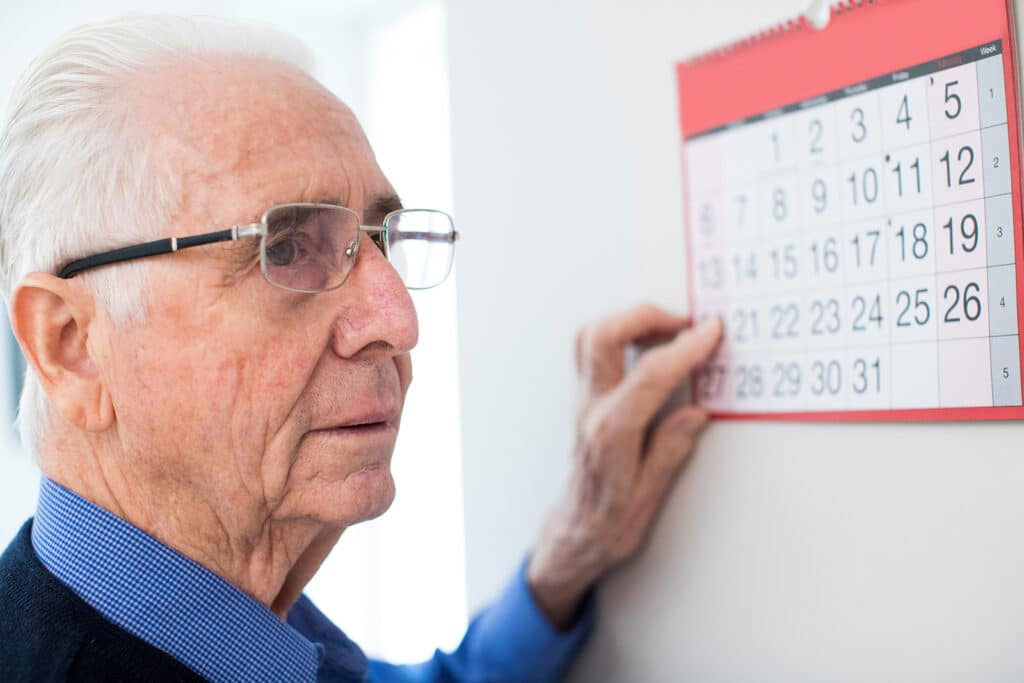From losing your keys to forgetting a name to wondering why you walked into a room, we all have moments of forgetfulness. But as we age, these things become more concerning because we worry whether it may be more than just forgetfulness.
Dementia is becoming more prevalent. In fact, according to the Alzheimer’s Association, by 2050 more than 13 million Americans are expected to be living with this disease. Do you suspect this is affecting your loved one right now? If so, watch out for these signs of dementia.
Alzheimer’s Disease Versus Dementia
Alzheimer’s disease and dementia are terms that are often used interchangeably, but it’s important to know that Alzheimer’s disease is only one type of dementia. Dementia is not a disease in and of itself, but rather, it’s an umbrella term for loss of memory and other cognitive abilities severe enough to interfere with daily life. Disorders grouped under dementia are caused by abnormal brain changes, which trigger a decline in cognitive abilities and they also affect behavior, feelings, and relationships. While the Alzheimer’s Association states that Alzheimer’s disease accounts for 60 – 80 percent of cases, other types of dementia include:
- Vascular
- Lewy body
- Frontotemporal
- Other, including Huntington’s disease
- Mixed, which is dementia from more than one cause
Some types of dementia, such as Alzheimer’s disease, are progressive: meaning they start out slowly and gradually get worse. What’s more, there are a range of conditions that can cause symptoms of dementia, such as thyroid problems and vitamin deficiencies which may improve if the condition is treated. Regardless, in all circumstances, if you suspect signs of dementia in your loved one, early diagnosis is vital.
Signs of Dementia
The distinguishing factor as to whether your loved one’s forgetfulness could be something more is whether or not it impacts their daily life, such as their ability to work, live independently, and/or function socially. As such, the Alzheimer’s Association has identified signs of dementia that include:
- Forgetting recently learned information, important dates or events, asking the same questions over and over, and increasingly needing to rely on memory aids.
- Challenges in planning or solving problems like keeping track of monthly bills.
- Difficulty completing familiar tasks: like driving to a familiar location or getting the grocery list together.
- Confusion with time or place, forgetting where they are or how they got there.
- Trouble understanding visual images and spatial relationships such as- judging distance and determining color or contrast.
- New problems with words in speaking or writing such as having trouble following a conversation or stopping in the middle of one, having trouble naming a familiar object, or calling it by the wrong name.
- Misplacing things and losing the ability to retrace steps.
- Decreased or poor judgement like in dealing with money or paying less attention to keeping themselves clean.
- Withdrawal from work or social activities that they once enjoyed.
- Changes in mood and personality, like becoming suspicious, depressed, fearful, or anxious, particularly in places or situations outside their comfort zone.
What To Do About Signs of Dementia
If your loved one shows signs of dementia, schedule an appointment with their doctor right away. There’s no one test that diagnoses dementia or Alzheimer’s disease; it’s based on medical history, physical and neurological exams, lab tests, brain imaging, and the signs we’ve described above. While dementia itself can be pretty clearly determined, the specific type may not be identified with a high level of certainty because some symptoms and parts of the brain affected can overlap. Treatment of dementia differs based on the cause. Currently, there is no cure for Alzheimer’s disease. But, treatments to slow symptoms and improve quality of life are available.
Initially you may decide care at home works best for your loved one. But if and when needs progress, memory care is a common solution outside the home. It is a type of senior living that is designed to nurture those with Alzheimer’s disease and dementia specifically. You’ll find 24-hour supervision, individualized care by specially trained staff and a secure yet comfortable environment.
We believe an engagement-focused philosophy of care and support offers the most benefit for residents in memory care. As such, our Vital Brain Program is founded in the belief that everyone has an innate ability to learn and succeed, no matter the degree of cognitive impairment. By focusing on what your loved one can or wants to do (instead of the skills they may have lost), they can still live their best life regardless of where they’re at in the disease.
Key components of our Vital Brain Program include:
- Daily opportunities to build cognitive strength
- Learning and experiencing new things
- Practicing stress reduction
Check out The Beginner’s Guide to Recognizing Early Signs of Dementia to learn more. Or, contact your nearest Vitality Living community today to schedule your tour!




